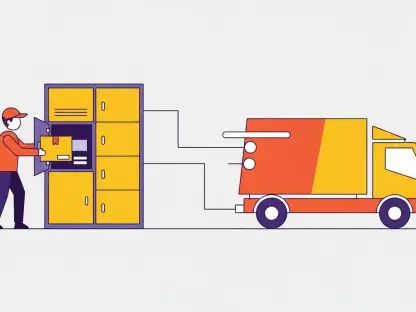Fermanagh and Omagh District Council is grappling with a pressing challenge: the apparent prioritization of parcel delivery over letters by Royal Mail has caused significant disruptions for residents. Individuals have missed crucial medical and benefits appointments, triggering widespread concern. This issue was thrust into the spotlight following a recent council meeting, where Sinn Féin Councillor Sheamus Greene highlighted that letters are now reportedly delivered only once a week due to the focus on parcels. This concern was further supported by Councillor Debbie Coyle and Ulster Unionist Councillor Victor Warrington, who both confirmed the problem’s pervasive nature.
Impact on Health Services
Missed Medical and Benefits Appointments
It was evident during the council meeting that there is a growing unease about the consequences of delayed letter delivery on health services. Councillor Sheamus Greene pointed out that many crucial appointments are missed simply because the letters notifying individuals of their schedule arrive too late. This has placed an unnecessary strain on the Health Service, as rescheduling appointments not only impacts those who missed them but also reduces the availability of slots for other patients. The council’s decision to seek a formal explanation from Royal Mail highlights the gravity of the situation.
The council’s unanimous vote to demand clarity from Royal Mail underscores the broader implications of this communication breakdown. The delayed letters not only affect individual health outcomes but disrupt the systemic efficiency of healthcare services across the area. With rural areas such as Fermanagh and Omagh already facing accessibility issues, the additional burden of unreliable mail delivery exacerbates ongoing healthcare challenges. Thus, a comprehensive solution addressing these delays is critical, ensuring timely communication between healthcare providers and patients.
Universal Service Obligation Shortcomings
One of the central issues brought to light is the lapse in Royal Mail’s adherence to the Universal Service Obligation (USO), which mandates the delivery of first- and second-class letters six days a week. Performance data from July to September 2024 revealed that Royal Mail met only 76.3% of first-class and 92.6% of second-class delivery targets, a significant drop from the required 93% and 98.5%, respectively. This significant disparity illustrates the ongoing challenges in maintaining service standards, particularly in rural regions.
The Consumer Council has been a vocal advocate, emphasizing Royal Mail’s obligation under the USO. Their research, commissioned in 2023, highlighted a marked decline in mail delivery reliability since the outbreak of the COVID-19 pandemic. This data underscores how fundamental service expectations have shifted, with many consumers no longer relying on first-class mail to arrive promptly. Instead, there is a growing perception that first-class mail is now akin to second-class in terms of delivery timelines, reflecting broader systemic issues within Royal Mail’s operations.
Reliability Decline and Consumer Concerns
Findings From Consumer Research
Research conducted by the Consumer Council in 2023 painted a grim picture of Royal Mail’s service reliability. The study illuminated a significant decline in the speed and reliability of mail delivery since the pandemic. Consumers reported longer wait times and a noticeable shift in perception regarding the speed of first-class mail, which many now view as being as slow as second-class mail. This has led to an increase in hesitancy among consumers when deciding to use second-class mail, given the perceived and experienced sluggishness.
These findings serve as a vital insight into the broader malaise affecting Royal Mail’s services. The compromised reliability not only influences consumer behavior but undermines overall trust in the postal system. Rural communities, in particular, bear the brunt of these inefficiencies, intensifying the need for a reassessment of Royal Mail’s service delivery strategies. The decline in consumer confidence highlighted by the data is indeed a call to action for Royal Mail to revamp its processes and restore faith in its operational capabilities.
Royal Mail’s Response and Efforts
In response to concerns about prioritizing parcels over letters, Royal Mail cited the need for more sorting and storage space during busy periods as a primary reason. They emphasized that their goal remains to deliver all mail, both letters and parcels, on time. Royal Mail maintains that they strive to deliver mail to most addresses six days a week, with a contingency plan to deliver the next working day if delays occur.
Despite these assurances, the persistent issues suggest that more robust measures are necessary to meet delivery standards consistently, especially in rural areas. The overall reduction in service reliability calls for an internal review by Royal Mail to address operational inefficiencies. The Consumer Council’s involvement indicates a broader appeal for accountability and better service. With the support offered by the Consumer Council for complaints related to postal services, consumers have an outlet for their grievances, providing an avenue for resolution.
Call for Reevaluation
Addressing Prioritization and Strategy
The overarching theme emerging from these discussions is a pronounced dip in mail delivery reliability, coupled with the problematic prioritization of parcels over letters. For particularly affected rural residents, these issues pose significant inconveniences. There is an evident need for Royal Mail to reevaluate its current delivery strategy to ensure it meets its obligations more effectively. This reevaluation should encompass a thorough analysis of current processes, identification of inefficiencies, and formulation of more robust operational tactics.
Future considerations should include the potential restructuring of sorting and delivery schedules to balance the demands of parcel and letter deliveries. Augmenting the workforce or adopting more advanced logistics technology could also enhance efficiency. These steps, coupled with constant performance monitoring, are integral to restoring the credibility and reliability of Royal Mail’s services.
Ensuring Compliance With USO
Fermanagh and Omagh District Council faces a significant challenge as Royal Mail’s apparent prioritization of parcel delivery over letters has caused considerable issues for residents. People have missed important medical and benefits appointments, leading to widespread concern. This matter gained attention during a recent council meeting, where Sinn Féin Councillor Sheamus Greene emphasized that letters are reportedly being delivered just once a week due to the focus on parcels. Councillor Debbie Coyle and Ulster Unionist Councillor Victor Warrington corroborated the problem’s widespread nature. They pointed out that this disruption in regular mail services affects crucial aspects of everyday life, including the timely receipt of medical information and benefits notifications. The council is now under pressure to address this concern and ensure that Royal Mail prioritizes all types of deliveries to prevent further inconveniences for the community.








